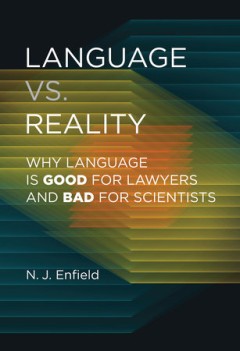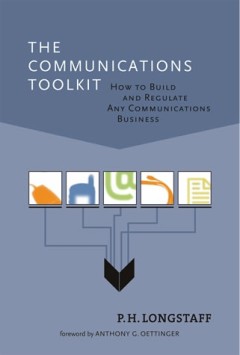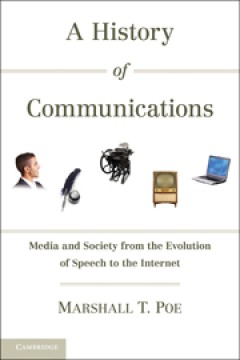Filter by

Telecommunications Switching Principles
Possibly the largest interconnected systems in the world are telecommunications networks for public and private use. The principles underlying the design of the transmission and terminal components in this worldwide network are well established and coherent; however those involving the design of the switching center component are not. Based on the author's many years of experience in the design…
- Edition
- -
- ISBN/ISSN
- 9780262310802
- Collation
- 1 online resource (xiii, 327 pages) :illustrations
- Series Title
- -
- Call Number
- -

Animal thinking :contemporary issues in comparative cognition
"Eighth Ernst Str?ungmann Forum held Sep. 26-Oct. 1, 2010, Frankfurt am Main.""Do animals have cognitive maps? Do they possess knowledge? Do they plan for the future? Do they understand that others have mental lives of their own? This volume provides a state-of-the-art assessment of animal cognition, with experts from psychology, neuroscience, philosophy, ecology, and evolutionary biology addre…
- Edition
- -
- ISBN/ISSN
- 9780262298988
- Collation
- 1 online resource (xi, 342 pages) :illustrations (some color).
- Series Title
- -
- Call Number
- -

Climate Change :What It Means for Us, Our Children, and Our Grandchildren
"This revised and updated collection of essays on climate change incorporates the latest scientific research and policy initiatives on the subject. It describes recent major legislative actions, analyzes alternative regulatory tools (including new uses of taxes and markets), offers increased coverage of China and other developing nations, discusses the role of social media in communicating abou…
- Edition
- Second edition.
- ISBN/ISSN
- 9780262322300
- Collation
- 1 online resource (xiii, 343 pages) :illustrations.
- Series Title
- -
- Call Number
- -

Language vs. reality :why language is good for lawyers and bad for scientists
"Argues that the primary function of language is not to describe the physical world but to manage the social one. Aimed at a general readership"--OCLC-licensed vendor bibliographic record.
- Edition
- -
- ISBN/ISSN
- 9780262368766
- Collation
- 1 online resource (ix, 298 pages) :illustrations
- Series Title
- -
- Call Number
- -

The Communications Toolkit: How to Build and Regulate Any Communications Busi…
A toolkit of basic principles to help those in business, industry, law, and other professions deal with a constantly changing communications sector. OCLC-licensed vendor bibliographic record.
- Edition
- -
- ISBN/ISSN
- 9780262278539
- Collation
- 1 online resource (xiv, 271 pages) :illustrations
- Series Title
- -
- Call Number
- -

Communicative Action and Rational Choice
Originally published: 2001.In this book Joseph Heath brings Jurgen Habermas's theory of communicative action into dialogue with the most sophisticated articulation of the instrumental conception of practical rationality-modern rational choice theory. Heath begins with an overview of Habermas's action theory and his critique of decision and game theory. He then offers an alternative to Habermas'…
- Edition
- -
- ISBN/ISSN
- 9780262275156
- Collation
- 1 online resource (xii, 363 pages) :illustrations.
- Series Title
- -
- Call Number
- -

Texture: Human Expression in the Age of Communications Overload
Our workdays are so filled with emails, instant messaging, and RSS feeds that we complain that there's not enough time to get our actual work done. At home, we are besieged by telephone calls on landlines and cell phones, the beeps that signal text messages, and work emails on our BlackBerrys. It's too much, we cry (or type) as we update our Facebook pages, compose a blog post, or check to see …
- Edition
- -
- ISBN/ISSN
- 9780262289474
- Collation
- -
- Series Title
- -
- Call Number
- -

Information, mechanism and meaning
A collection of selected papers written by the information theorist and "brain physicist," most of which were presented to various scientific conferences in the 1950s and 1960s. Most of this collection concerns MacKay's abiding preoccupation with information as represented and utilized in the brain and exchanged between human beings, rather than as formalized in logical patterns of elementary p…
- Edition
- -
- ISBN/ISSN
- 9780262256605
- Collation
- 1 online resource (viii, 196 pages)
- Series Title
- -
- Call Number
- 001 MAC i

The meaning of proofs :mathematics as storytelling
Translation of: Matematica come narrazione : raccontare la matematica."This book introduces readers to the narrative structure of mathematical proofs and why mathematicians communicate that way, drawing examples from classic literature and employing metaphors and imagery"--OCLC-licensed vendor bibliographic record.
- Edition
- -
- ISBN/ISSN
- 0262371030
- Collation
- 1 online resource.
- Series Title
- -
- Call Number
- -

A History of Communications Media and Society from the Evolution of Speech t…
A History of Communications advances a theory of media that explains the origins and impact of different forms of communication - speech, writing, print, electronic devices and the Internet - on human history in the long term. New media are 'pulled' into widespread use by broad historical trends and these media, once in widespread use, 'push' social institutions and beliefs in predictable direc…
- Edition
- -
- ISBN/ISSN
- 9780511976919
- Collation
- -
- Series Title
- -
- Call Number
- -
 Computer Science, Information & General Works
Computer Science, Information & General Works  Philosophy & Psychology
Philosophy & Psychology  Religion
Religion  Social Sciences
Social Sciences  Language
Language  Pure Science
Pure Science  Applied Sciences
Applied Sciences  Art & Recreation
Art & Recreation  Literature
Literature  History & Geography
History & Geography